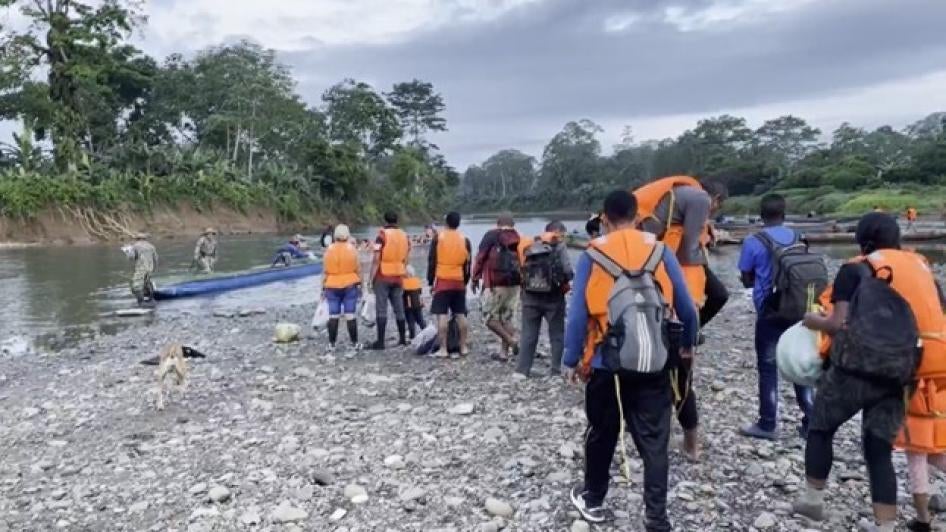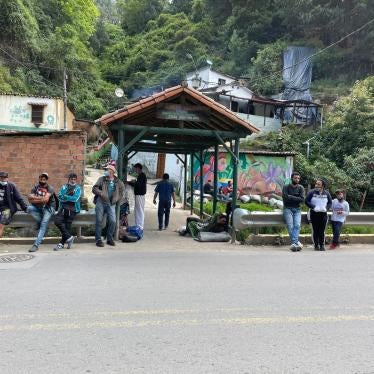(New York) – New visa restrictions by several countries in the Americas have led to a significant increase in the number of Venezuelans crossing a dangerous jungle area on the Colombia–Panama border, known as the Darien Gap, exposing them to egregious abuses, Human Rights Watch said today.
The number of Venezuelans crossing the Darien Gap into the North American continent has skyrocketed over the past year as countries imposed visa restrictions making it more difficult for Venezuelans to travel by plane to Mexico and Central America. Venezuelans have surpassed Cubans and Haitians as the largest national group making the crossing in 2022, accounting for more than a third of all migrants doing so. During their days-long walk across the gap, migrants of all nationalities are frequently victims of robbery and serious abuses, including rape. They also face dangerous natural conditions, such as rushing rivers and wild animals.
“People fleeing human rights crises in countries in the region should have a safe and orderly way to seek protection abroad,” said Tamara Taraciuk Broner, acting Americas director at Human Rights Watch. “Leaders who recently signed the Los Angeles Declaration on Migration and Protection should honor their commitment by urgently reversing immigration measures that are forcing people into dangerous crossings.”
On June 10, 2022, 20 countries, including the United States, Mexico, Costa Rica, Panama, and Honduras, signed the Los Angeles Declaration on Migration and Protection at the Summit of the Americas in Los Angeles. The declaration, spearheaded by US President Joe Biden, includes commitments to strengthen and expand ways for people to safely and legally migrate and seek asylum and to pursue accountability for those who commit abuses against migrants.
In April and May, Human Rights Watch traveled to Necoclí, in Colombia; Metetí, Canaán Membrillo; and David, in Panama, to document abuses against migrants and asylum seekers of all nationalities crossing the Darien Gap, and to assess the authorities’ systems to protect migrants and ensure access to justice. Human Rights Watch interviewed over 100 migrants and asylum seekers, including dozens of Venezuelans, as well as aid workers and Panamanian government officials, including Attorney General Javier Caraballo, the Deputy Health Minister Ivette Berrío, and Deputy Foreign Minister Marta Elida Gordón.
Most migrants who make the dangerous journey across the Darien Gap do so because they cannot obtain visas to travel north by plane. For years, the majority have been Cubans and Haitians. Since January 2022, Mexico, Costa Rica, and Belize have imposed new visa requirements on people from countries whose citizens have been arriving at the US southern border in greater numbers, including Venezuelans. Additionally, Panama, Honduras, and Guatemala have requested visas for Venezuelans since 2017. Many Venezuelans say they are traveling through the Darien Gap because these visa requirements have limited their ability to take safer routes to seek protection in the United States.
In some cases, governments have reportedly imposed these new immigration restrictions in response to pressure from the United States. In a May 2022 US Senate hearing, a State Department official said that, when the US sees an increase in people of a certain nationality arriving at the southern border, it communicates that information to governments in the region to “look for areas of partnership.” Countries may then decide “through their own sovereign decision-making process … to impose visas on those nationalities to make sure that those who are arriving by air are not intending … [to immigrate] to the United States,” the official said. The Biden administration then continues “working in partnership” with other countries “to ensure that route is not diverted” through another country, she said.
In 2021, a record 133,000 people crossed the Darien Gap, including 29,000 children, according to official data from Panamanian authorities. In the first four months of 2022, the number of migrants and asylum seekers crossing the gap almost doubled from the same months in 2021. Panamanian authorities told Human Rights Watch that the total number of migrants crossing the gap is expected to increase in 2022.
Most Venezuelans crossing the gap told Human Rights Watch they were escaping the harsh economic conditions in their country and the difficulty of accessing basic necessities, particularly medicine and food, due to the country’s humanitarian emergency. Some said that government authorities, security forces, or gangs had persecuted them. While some had lived in other Latin American countries immediately before their trip, many others said they had left Venezuela in recent weeks.
Flying to Mexico or Central America is not only safer than the overland journey, but most likely cheaper, according to interviews with migrants. The Darien Gap journey could cost hundreds, or even thousands, of dollars. Migrants crossing the Darien gap are currently taking two routes, Human Rights Watch found. Some pay a US$300 fee per passenger for a boat from Capurganá, in Colombia, to Carreto, in Panamá, and walk from two to five days across the jungle – a safer route, where fewer abuses have been reported. Those who cannot afford to pay that amount walk from six to ten days across the jungle from Capurganá.
Many migrants who have taken this longer route said they were assaulted by gangs who robbed and threatened them. Between January and May, Médecins Sans Frontières (Doctors without Borders or MSF) provided medical and psychological assistance to 89 women of various nationalities who suffered sexual abuse in the Darien Gap.
Humanitarian workers said that because many Venezuelan migrants lack sufficient money, they are more likely than others to take the longer, more dangerous route. Some sleep on a beach in Necoclí, Colombia, for several days until they can obtain enough money, often by collecting trash, to continue their journey.
Most unaccompanied children who take the Darien Gap route are Venezuelan, according to Panamanian authorities and humanitarian workers. Some started their journey without their parents; others lost contact with them along the way.
A 21-year-old Venezuelan woman who crossed the Darien Gap with four friends in April, on their way to the United States, said she fled Venezuela because of “the dire situation in the country.” A group of black-hooded men with a machete robbed them as they were crossing. The woman and her friends said they were originally planning to fly to Mexico but decided to take the Darien route after the visa requirements entered into force.
A 32-year-old pregnant woman said she fled Venezuela with her partner because they were unable to obtain sufficient food and medicines. A group of men assaulted them in the jungle. They spent days without eating. She said she was bleeding when she arrived in Panama, and received medical treatment from aid workers there.
“It would be impossible for us to obtain the documentation to travel regularly to Mexico,” her partner said, referring to both Venezuelan documentation and the visa. Human Rights Watch researchers saw them days later, crossing into Costa Rica, continuing their journey to the US.
The number of Venezuelans detained by Mexican immigration authorities after entering the country irregularly has increased dramatically since the new visa requirements came into effect. According to official figures, Mexican authorities detained 6,666 Venezuelans in the first four months of 2022, compared with 96 in the same four months of 2021.
The number of Venezuelans seeking asylum in Mexico has also increased. In the first four months of 2022, 4,270 applied, compared with 6,192 in all of 2021. Asylum seekers in Mexico are often forced to wait for months or years in appalling conditions to obtain legal status.
Visa requirements are particularly difficult to fulfill for Venezuelans who frequently do not have passports or other required documentation. Official documents – including marriage and birth certificates – are hard to obtain in Venezuela and abroad, given that Venezuelan consular services are scarce. While the official fee for obtaining a passport in Venezuela is roughly $200, some officers charge more. This fee is unaffordable for most Venezuelans, who are paid the minimum wage of about $28 a month.
“The immigration restrictions imposed by Mexico and Central American governments have not dissuaded thousands of migrants from leaving their homes to seek protection abroad,” Taraciuk Broner said. “Instead, they have driven many to take dangerous, irregular routes, where they face serious risks and often suffer abuses and violence."









